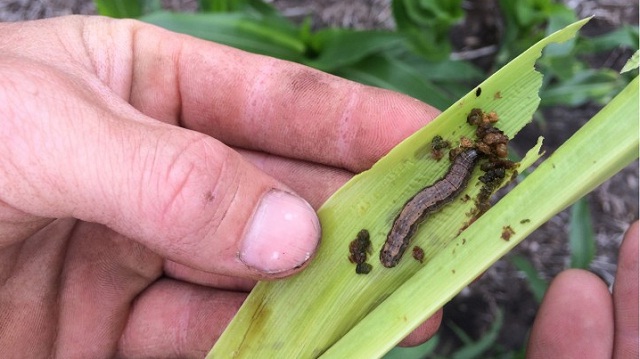
Kampala, Uganda | THE INDEPENDENT | Farmers faced with the outbreak of the fall armyworm should go slow on harmful pesticides or risk dire environmental consequences.
Scientists at Centre for Agricultural and Bioscience International are instead recommending the use of more environmentally sustainable biological controls through Integrated Pest Management (IPM).
Integrated Pest Management (IPM) involves a combination of practices like biological control, habitat manipulation, modification of cultural practices, and use of resistant varieties.
If properly applied, it can lead to a reduction in the use of chemicals and it can offer an economic incentive to growers by the increase in quality.
The scientists in a new paper published in the International Journal of Pest Management suggest that policy should be geared towards educating farmers about the pest and appropriate control practices that do not heavily rely on synthetic products.
Dr Justice Tambo led a team of researchers farm household in Zambia and Ghana during the 2016/2017 maize cropping season said farmers need to be advised on the rational use of pesticides.
Tambo and other scientists recommend that other control options using biological agents should be explored to fight the pest which is threatening the food security of more than 200 million people worldwide.
Tambo revealed that their study showed that 51 percent of households sampled in Ghana and 49 percent in Zambia used pesticides to control fall armyworm.
The scientists however observed that the chemical pesticides are costly and their effectiveness and impact on human health and the environment requires further research.
“Furthermore, while 39 percent and 42 percent of households, respectively, received information on FAW from neighbours and extension officers, we recommend that policy efforts should focus on widespread communication campaigns and training programmes with a stronger focus on biological controls.”
Tambo said farmers also need to be educated and advised on other Integrated Pest Management techniques to manage fall armyworm including constant weeding to remove alternative host plants; crop rotation and intercropping of maize with non-host plants; and uprooting and burning of infected plants to destroy larvae and pupae.
“In order to convince farmers that IPM strategies which lean more towards more sustainable biological controls are a viable option, we must demonstrate that the cost is less than the value of the yield saved,” he said.
Uganda is one of the countries that have encouraged pesticide application in in the fight of fall armyworm. Pesticides like rocket chlobenzo, striker, prove, engeo, supa profenofos, hitchel among others to fight fall armyworm pests.
The country has of recent been flooded with imported pesticides imported pesticide. A number of researchers have warned of widespread misuse of the pesticide especially when applied without guidance of extension workers.
George Wamukota, a small-call farmer based in Buikwe is one of the farmers that had most of his maize crop damaged by a pesticide procured from an outlet in Jinja.
He told URN that while the rocket pesticide that he had applied manage to clear the garden off the pests, it had a damaging effect of the leaves and that some of the plants were permanently damaged.
Wamukota’s mistake was that he mixed a full tin of rocket into one spray pump expecting that a high concentration of the chemical would be more effective.
Commissioner for Crop Protection at MAAIF, Stephen Byantwale could not be reached for comment about whether Integrated Pest Management could be one of the control methods.
Entomologists at National Agricultural Research Organization have also encouraged Integrated Pest Management practices against the fall armyworm.
Some farmers have in the past testified having applied ash , red pepper among others to fight the maize-damaging pest. The fall armyworm (FAW, Spodoptera frugiperda) originates from the tropical and sub‐tropical regions of the Americas.
The fall army worm recently has spread rapidly across more than 30 countries in the continent in Africa.
Some studies are ongoing to determine whether biopesticides can be applied as alternative to chemical pesticides being promoted and used for FAW management.
******
URN
 The Independent Uganda: You get the Truth we Pay the Price
The Independent Uganda: You get the Truth we Pay the Price





